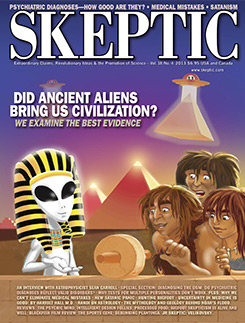I only recently became aware of the National Geographic Channel’s 2012 “Aliens Among Us” poll, which determined that 77% of Americans believe there are signs that aliens have visited the Earth in the past. The idea that aliens might have visited the Earth in the past is not inherently silly. As I point out in my January column for the Columbus Dispatch, the late Carl Sagan argued that there is a “statistical likelihood that Earth was visited by an advanced extraterrestrial civilization at least once during historical times.” Moreover, he argued that it was not out of the question that “artifacts of these visits still exist.” His argument was largely theoretical, however, and he never took at all seriously any of the alleged evidence offered by ancient aliens enthusiasts. In his book Brocas Brain: reflections on the romance of science, Sagan wrote: In the long litany of ancient astronaut pop archaeology, the cases of apparent interest have perfectly reasonable alternative explanations, or have been misrepresented, or are simple prevarications, hoaxes and distortions. I was surprised by the results of the National Geographic Channels poll, since over the last couple of decades I had gotten the impression that ancient astronauts had been almost entirely relegated to fantasy its proper genre.
Whenever I would bring up the idea, while teaching the occasional course at a local university, most of the students had never even heard of it. I suppose the popularity of the History Channel’s program Ancient Aliens has had a lot to do with the recent resurgence of interest in the subject. Chris White, an author and filmmaker, has produced a documentary, Ancient Aliens Debunked, in which he provides concrete examples of those misrepresentations, prevarications, hoaxes and distortions referred to by Sagan. He also has an article in the current issue of Skeptic in which he presents some of what he uncovered in his research for the film. White says that Ancient Aliens isnt solely to blame for the increasing belief in ancient astronauts; films such as Knowing and Prometheus have certainly played a role as well. But theres more to it than that. In Brocas Brain, Carl Sagan expressed the opinion that the popularity of borderline science is a rebuke to the schools, the press and commercial television for their sparse, unimaginative and ineffective efforts at science education; and to us scientists, for doing so little to popularize our subject.
White says that Ancient Aliens isnt solely to blame for the increasing belief in ancient astronauts; films such as Knowing and Prometheus have certainly played a role as well. But theres more to it than that. In Brocas Brain, Carl Sagan expressed the opinion that the popularity of borderline science is a rebuke to the schools, the press and commercial television for their sparse, unimaginative and ineffective efforts at science education; and to us scientists, for doing so little to popularize our subject.
I agree and one of my goals both for my regular column in the Dispatch and my contributions to this blog is to present the real wonders of Ohio archaeology to a broad audience and occasionally to expose the charlatans who try to substitute ersatz wonder for the real thing. Ancient astronauts can make for fun fantasy, but all the evidence shows that our ancestors deserve all the credit for their many amazing achievements. You might be asking yourself Why bother? What does it really matter if three out of four people think ancient aliens helped to build the pyramids? What harm does it do? What matters is that there is an underlying racism, or at least ethnocentrism, to the theory. Think about it. Most of the marvelous monuments of antiquity that are said to have required the help of ancient aliens are in non-European countries. The Greeks evidently built the Parthenon on their own. The Romans certainly built the Colosseum without extraterrestrial assistance. And yet the champions of ancient aliens want you to believe that the Egyptians needed special help to build their pyramids. And those poor savages on Easter Island certainly couldn’t have carved and moved all those gigantic statues on their own. Actually, the Easter Islanders most certainly did erect those statues on their own. Really, its not that hard to move big stones, but its a bit like a magic trick it only seems impossible when you don’t know the secret. There are lots of archaeological mysteries out there and ancient aliens are not the solution to any of them! Appeals to ancient aliens dont just distract us from the real solutions; they lull us into accepting the ethnocentric assumption that just because we dont understand how another culture did some great thing, they therefore couldnt have done it on their own. It matters a lot that three out of four Americans dont seem to have a problem with that kind of thinking.
Brad Lepper